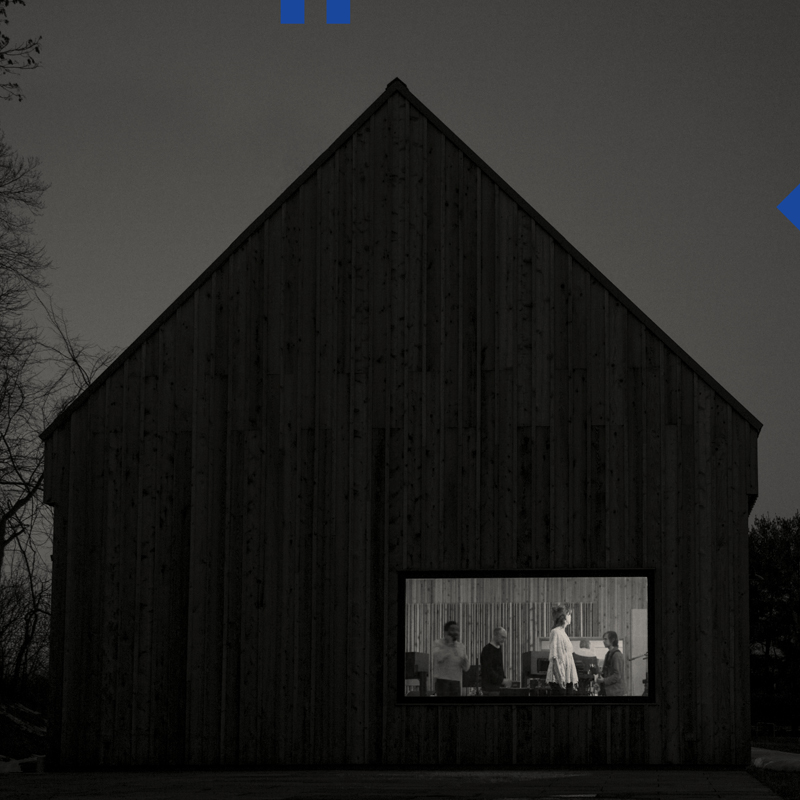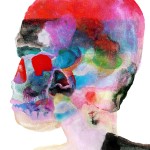The National – Sleep Well Beast

Matt Berninger’s songs have always centered around the inescapable claustrophobia of being human. You can try and hide your worst qualities, but they’re a part of you. There’s no running from who you are when the lights are out and you’re alone—or when you see them reflected in those closest to you. That quiet self-loathing has been the through-line that runs through The National’s discography, infused even into Berninger’s most abstract lyrics. Often, they’ve been wrapped in wry self-deprecation—the pathetic swagger of Alligator’s “All the Wine,” the self-mocking spirituality of Boxer’s “Mistaken for Strangers“—but as The National have aged, they’ve started skewing more melancholy.
Maybe Berninger got most of it out of his system with his EL VY collaboration with Ramona Falls’ Brent Knopf (which featured some of his goofiest, most absurd songwriting), because while humor remains part of the National’s excellent latest album, Sleep Well Beast, the record is as quietly melancholy as anything the band have ever done before. It’s a quiet record of middle-aged self-assessment, anchored by the lush production and subtly catchy songwriting that have long defined The National’s career.
It’s important to address that subtle melancholy shift in Berninger’s lyrics because, musically, Sleep Well Beast isn’t a dramatic departure from what the band’s done before. For all the comparisons that the band gets to that other brotherly, five-piece rock band—a recent Guardian feature described them as “America’s Radiohead”—they’ve never been a band for album-by-album sonic reinventions. Like Trouble Will Find Me before it, Sleep Well Beast is very much of a piece with its preceding catalog, with just enough subtle shadings to differentiate itself.
For Sleep Well Beast, it’s the electronic flourishes that set it apart. Bryan Devendorf’s production is twitchier than it’s ever been, underscoring the deep anxiety of Berninger’s lyrics. That’s most apparent on album standout “I’ll Still Destroy You,” in which Devendorf’s drumming is accompanied by a skittering drum machine that slowly propels the song into a manic finale. But it’s also there on songs such as “Born to Beg” or the title track, mid-tempo numbers that keep the upbeat percussion bubbling just beneath the surface.
There are three out-and-out rock songs on Sleep Well Beast, all of which happen before the album’s midpoint. Two of them have already been released as singles—”Day I Die” and “The System Only Dreams in Total Darkness”— and they’re destined to be festival crowd-pleasers. (The third, “Turtleneck,” is full of chaotic distortion, and is the closest the album gets to the acidic cheekiness of, say, Alligator.) “Day I Die” in particular evokes some of U2’s stadium-sized hits, with its cascading guitar riffs and singalong chorus. (In the extended family of U2 offspring, it’s the more serious younger brother of Coldplay’s “Every Teardrop Is a Waterfall.”) But pianos, not guitars, are the foundation for the majority of the album’s songs, anchoring the low end of slow-burn ballads such as “Guilty Party,” “Born to Beg,” and “Nobody Else Will Be There.” It’s rich yet reserved—anything too dramatic would throw off the sense of intimacy that the album spends much of its runtime building.
The real tension of any National record, though, comes from putting those beautiful, refined arrangements up against the rawness of Berninger’s lyrics—which, even at their most abstract, can occupy unsettling, sometimes emotionally ugly territory. At points, Sleep Well Beast seems like it’s in conversation with the band’s earlier songs. “Nobody Else Will Be There,” is a song about dodging parties in the same vein as Alligator opener “Secret Meeting,” except that Berninger has traded out his obstinate insularity for desperate codependence, a desire to be alone with someone. That continues into “Day I Die,” which finds Berninger uncomfortable at yet another social gathering, getting drunker and angrier at the situation. He reminds himself of his uncle, he says—Valentine Jester, the titular character of another Alligator track—an angry drunk. “I’m just like you, Valentine / Just come outside and leave with me,” he sings.
That desperate loneliness permeates most of the love songs here—the desperate plea of “Born to Beg,” the fictionalized dissolution of a relationship in “Guilty Party”—that gives even the album’s sweetest moments a sharp edge. Berninger’s most affecting lyrical turn on the album, though, comes from “I’ll Still Destroy You,” which appears to be an address from a father to his child, apologizing for the bad traits that the child will no doubt inherit. “Put your heels against the wall / I swear you got a little taller since I saw you,” he sings. “I’ll still destroy you.” Even the deepest moments of love are tinged with self-criticism, if not outright self-loathing.
That worry for the future is perhaps the strongest thematic through-line of the album, culminating with the title track, which ends on the refrain, “I’ll still destroy you some day / Sleep well beast / You as well beast.” In interviews, Berninger has said that the song is about a desire to simply hibernate until things get better. It’s a statement of hope, in a weird way—a hope that, despite the inevitability of hardships, despite the loneliness and anxiety that permeates everything—when the beast wakes up, everything will be all right.
Label: 4AD
Year: 2017
Buy this album at Turntable Lab
Similar Albums: The War on Drugs – A Deeper Understanding
The War on Drugs – A Deeper Understanding Manchester Orchestra – A Black Mile to the Surface
Manchester Orchestra – A Black Mile to the Surface Spoon – Hot Thoughts
Spoon – Hot Thoughts

